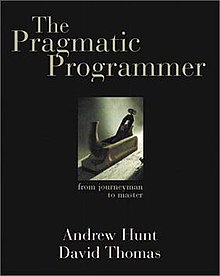The Facets of Ruby Series
 |
|
| Authors |
|
|---|---|
| Country | US |
| Subjects | Education, Teaching |
| Published | 1999 by The Pragmatic Bookshelf |
| Pages | 320 |
| ISBN | |
| Website | The Pragmatic Bookshelf: The Pragmatic Programmer |
The Pragmatic Programmer: From Journeyman to Master is a book about software engineering by Andrew Hunt and David Thomas, published in October, 1999, first in a series of books under the The Pragmatic Bookshelf label. It is an influential book in software engineering, and it is used as textbook in related university courses.
The book does not present a systematic theory, but rather a collection of tips to improve the development process in a pragmatic way. The main qualities of what the authors refer as a pragmatic programmer are being an early adopter, to have fast adaption, inquisitiveness and critical thinking, realism, and being a jack-of-all-trades.
The book uses analogies and short stories to present development methodologies and caveats, for example the broken windows theory, the story of the stone soup, or the boiling frog. Some concepts were named or popularised in the book, like code katas, small exercises to practice programming skills, and rubber duck debugging, a method of debugging whose name is a reference to a story in the book.
...
Wikipedia
